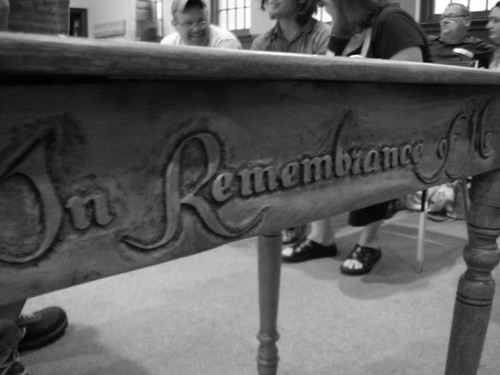
Subtitle, A strategy for Discipleship that Actually Changes Lives.
OF course I would be interested in this book for two reasons; One -its about discipleship, and two - my church needs emotional help, but then who's doesn't.
Peter begins the book with recounting his own critical need for a shift in ministry and life when his wife decides " I'm quitting the church." Like many pastors, Peter falls into the trap of loving the church and trusting God will take care of the rest, instead of loving his family and trusting God will take care of the rest, i.e ministry (I'm borrowing this distinction from Andy Stanley).
Peter puts a large emphasis on the need for spiritually healthy leadership as the path for a spiritually healthy church. If the leadership is out of balance, so will the church. Not exactly rocket science, but a significant truth. Scazzero also pushes at the desire for leaders to minimize weakness and elevate strengths. He encourages leaders to embrace and lead from weakness, being transparent about their growth edges. While this seems antithetical to the what the world teaches, it is essential to the health of the church.
Within the book, Scazzero has an emotional health survey. While overall I scored as an emotionally healthy adult, I scored as an adolescent in my understanding of limits ( notice my transparency). I also bordered on my understanding of my own vulnerability ( see . . .I'm being even more transparent).
Overall, Scazzero lays out a way for the church (and individuals) to experience transformation. Most churches, when it comes to problems, close their eyes, say a prayer, and hope people's brokenness goes away, only to find out later it never does unless embraced and named. Scazzero is big into naming family systems and how they affect our relationships ( very Bowen family system like).
While you might grab this book and pray that Scazzero lays out a step by step method and model for discipleship (IE. Purpose Driven Church; Building a Church of Small Groups, etc), he simply elevates the value of transformation through relationship, or incarnational ministry; being Jesus to one another in the way we love each other (getting into each other's lives). Like Ogden, Scazzero believes in peer mentoring; getting into close proximity with at least one other person, and getting under the surface of each other's lives. Needless to say, discipleship is messy and wonderful.
Overall, if you're looking for a packaged method for discipleship, you're out of luck. Scazzero lays out the values for transformation, and gives a lot of examples, but its not " Easy-bake discipleship". It does have discussion questions at the end of the book for each chapter, but I wouldn't say its a great small group resource. I would say its great for a church staff or elder board to go through as they navigate transition. Any book that helps a staff or elder board to name the past and the issues that keep the church from making disciples is a good book.
I enjoyed the book because my church is in such a place. I started reading this book when our pastors resigned, and had put it down. This week I picked it up again and it was both very confirming and healing. The principle of embracing my limits was particularly a fresh revelation and release that it's OK to not know everything as a leader. If you called my this week and I said "No, I can't" or " I don't know", I'm growing.
See you next Friday. I'm still considering what I'll read. I'll let you know Monday.
Friday, February 22, 2008
Book Review #4: The Emotionally Healthy Church by Peter Scazzero
Posted by George Atkins at 10:16 PM
Subscribe to:
Post Comments (Atom)

0 comments:
Post a Comment